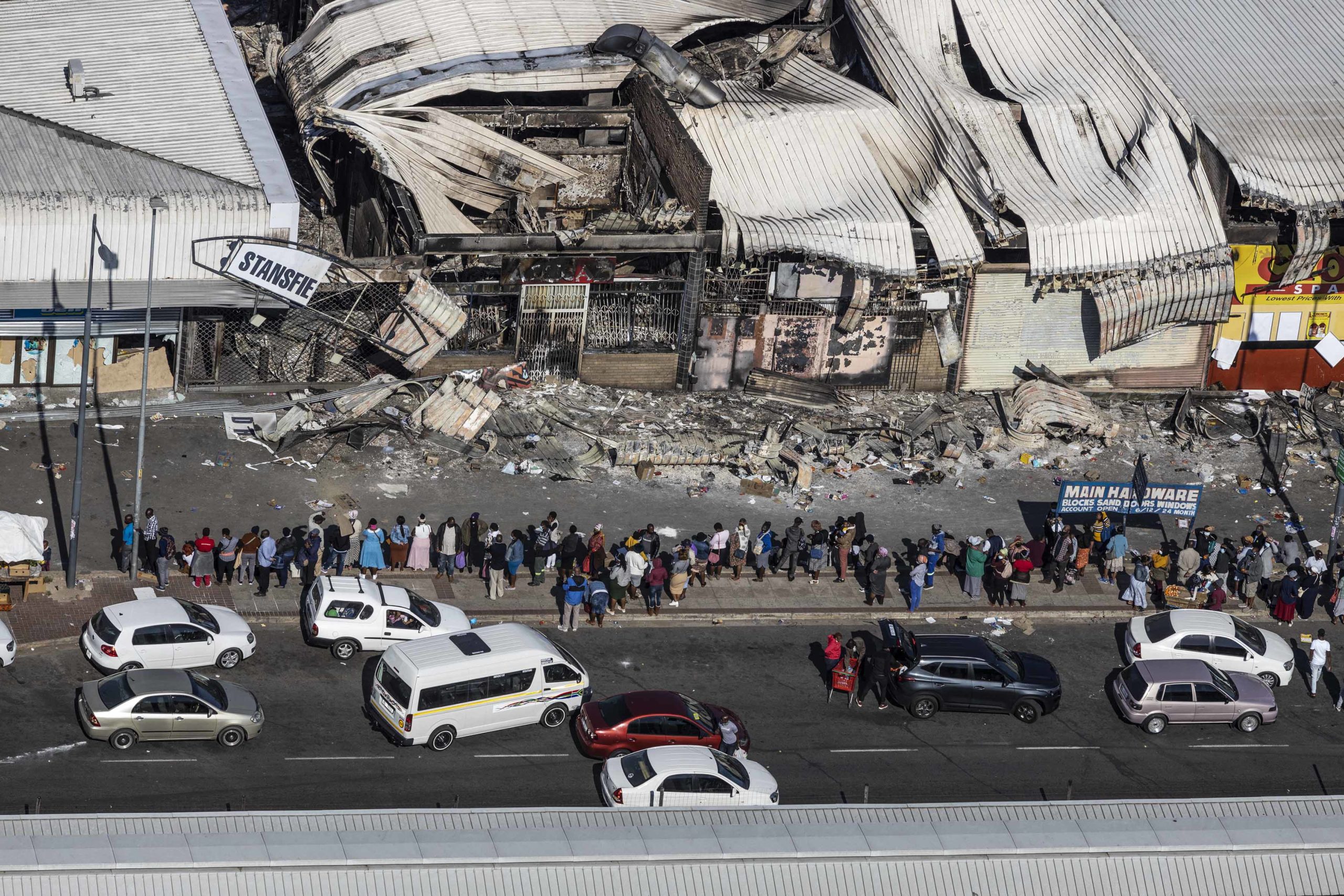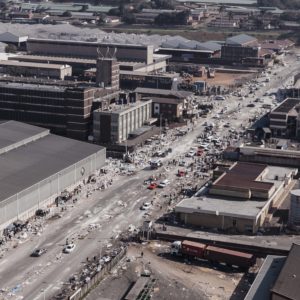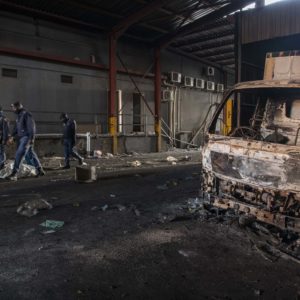Reality bites as food shortages and rations remain
Although companies affected by the riots are working round the clock to get supplies to shops, South Africans are facing long hours in queues to get basic staples to their families.
Author:
20 July 2021

Days of violence and the looting and burning of trucks, retail outlets, malls and warehouses in KwaZulu-Natal and some parts of Gauteng have resulted in food and fuel shortages never seen in post-apartheid South Africa.
These upheavals saw an appropriation of food and the closing of the N3 highway between the two provinces, which led to a dire shortage of basic supplies. Some customers had to start waiting in shop queues as early as 2am at the few businesses and retailers still operational.
Even then, they could buy only using bank cards as businesses did not want to handle cash in such volatile situations. Rationing was imposed to prevent panic buying and shoppers were limited to buying 10 or 15 items each. The hours of service were also severely reduced, with shops closing at 2pm for safety reasons and to allow them to restock empty shelves.
Many ran out of basic goods and fuel became scarce, too. Trucks carrying food and fuel were escorted by heavily armed police, soldiers from the South African National Defence Force (SANDF) and private security companies.
One of South Africa’s biggest food producers, Tiger Brands, reported that it had lost stock worth R150 million during the looting. Clothes retailer Mr Price Group reported that 109 of its stores were entirely cleaned out, while hundreds more had to close as a pre-emptive measure to prevent them from being looted.
According to the Durban Chamber of Commerce and Industry, the turmoil “has translated to huge damage for Durban’s economy”. The chamber said there had been stock losses of more than R1.5 billion and damage to property and equipment of more than R15 billion. In addition, over 50 000 informal traders had been affected as well as more than 40 000 businesses, a significant number of which might not recover.
Related article:
The deputy president of the chamber, Gladwin Malishe, said more than 150 000 jobs were at risk owing to the violence and looting and this could affect nearly 1.5 million households that would have no source of income.
“The total impact to the eThekwini GDP in the last five days is estimated at more than R20 billion. We believe the road to recovery will be a long one. The government needs to work closely with businesses in all sectors to ensure their security needs are met,” said Malishe.
“We have not required financial relief from the government. But we are working closely with all spheres of government to ensure adequate support is provided to the business community.”
Getting the wheels rolling
The crucial N3 highway corridor was reopened to all traffic on Friday 16 July. A week earlier, it was closed after 25 trucks were torched near the Mooi River toll plaza. The Road Freight Association (RFA) said the opening of the highway was a great relief as it would allow trucks to “resume the vital task of delivering goods both countrywide and beyond our borders”.
Gavin Kelly, the association’s chief executive, said the N3 is a strategic corridor for the delivery of food and other goods and the value of goods transported daily on it is estimated to be around R3 billion.
“Thankfully, trucks can now start the wheels of the economy along this corridor turning again, enabling many businesses to resume operations. The protection of trucks, the employees, the loads and distribution centres remain paramount for the RFA, and we call upon law enforcement to remain active and vigilant in protecting the N3. The safe passage of goods and people on this important route is vital. We cannot allow a repeat of last week’s senseless violence and looting,” said Kelly.
Related article:
The Shoprite Group, South Africa’s largest food retailer, said it was working round the clock to restock and rebuild its affected stores in KwaZulu-Natal and Gauteng. The company said it was also assessing the damage in its stores in township malls and other affected areas and would reopen them for business as soon as it was safe for both customers and employees.
“The mayhem and destruction are everyone’s loss, particularly in a country ravaged by a poor economy and joblessness, which have been exacerbated by the pandemic. The riots are only making our challenges, including food security, greater,” Shoprite said in a statement.
Related article:
Pieter Boone, chief executive of Pick n Pay Holdings, which owns Pick n Pay and Boxer retail stores, said the company would not be deterred by the looting and would reopen all the vandalised stores and restock those that had remained open throughout the chaos.
“We want to assure customers and communities that our Pick n Pay and Boxer teams are working flat out to bring essential supplies from Gauteng and the Western Cape into the affected areas [in KwaZulu-Natal].
“We plan to reopen even more [stores] in the coming days. As we do this, the safety of our colleagues and customers remains our first priority. Our message to the affected communities is this: the relief effort has begun. The relief is coming,” Boone said.
A bleak situation
These assurances were cold comfort to desperate shoppers waiting in long queues. Many were asking how South Africa had arrived at this untenable situation.
Charity Mnguni, a 38-year-old mother of two young children from Umlazi in Durban, was apprehensive as she waited in the long queue at Southway Mall on the afternoon of Thursday 15 July.
Earlier in the week, the mall had come under attack from armed men who were accompanied by hundreds of people. But security guards and local residents managed to repel the attack and force the attackers to retreat. As a result, members of the police, SANDF and private security guards armed with heavy weapons kept a close eye on the queuing shoppers.
Related article:
“If only I can get a maize meal, chicken and other few goods just to keep us going for a few days. We have nothing,” said Mnguni.
Thoko Didiza, the minister of agriculture, land reform and rural development, said the government was working with farmers and other producers to get much needed goods and essentials to distribution centres.
Gift of the Givers, a non-governmental organisation headed by Imtiaz Sooliman that provides disaster relief, said it had put its entire machinery into action to respond to the food crisis in affected areas. Sooliman said the organisation had received donations of food and other supplies from all over the world and would be distributing these to impoverished areas and shack settlements.




